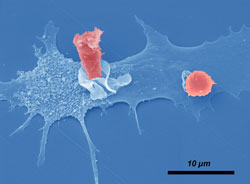Virus throws a wrench in the immune system

T cells are immune cells important for the defence against viruses. The on-going exposure to cytomegalovirus impairs their function. On the picture: Two T cells (red) interacting with a dendritic cell, another type of immune cell.<br>HZI / Rohde<br>
The cytomegalovirus (CMV) is a member of the herpesvirus family. Although most people carry CMV for life, it hardly ever makes them sick. Researchers from the Helmholtz Centre for Infection Research and from the USA have now unveiled long term consequences of the on-going presence of CMV:
Later in life, more and more cells of the immune system concentrate on CMV, and as a result, the response against other viruses is weakened. These research results help to explain why the elderly are often more prone to infectious diseases than young people.
The viral immunologist Professor Luka Cicin-Sain, head of the junior research group “Immune Aging and Chronic Infections” at the HZI in Braunschweig, Germany, and his colleagues have now published their discovery in the open access journal PLoS Pathogens. In the article, they describe that even months after infection with CMV, mice still show weaker responses against other viruses such as the flu virus.
Most adults are infected with CMV, yet this infection goes unnoticed. Usually that is of no consequence, because in the vast majority of cases, this herpesvirus does not make them sick. Only for people with a weak immune system, like organ recipients, AIDS patients, or unborn babies infected during pregnancy, the infection is dangerous. In everyone else, the virus becomes latent and persists in the body, but is kept at bay by the immune system. “In young people this lasting activation of the immune system might even be beneficial, because an active immune system may defeat other infections rapidly. But a bright candle burns down faster”, says Cicin-Sain, to clarify that the immune defence will wear out over the years. In elderly, the immune system loses function and its changes that present a clear loss of immune protection are summarily termed the “Immune risk profile”, shortly IRP. A relationship between IRP and the presence of CMV has been observed in several clinical studies. However, up to now it was unclear whether IRP is a consequence of the CMV infection or, vice versa, the IRP resulted in increased susceptibility to CMV infection.
The results of Cicin-Sain’s group and his American colleagues from the Oregon Health and Science University in Portland and from the College of Medicine of the University of Arizona in Tucson show that the on-going CMV presence contributes to immune ageing. “Of course the immune system ages without CMV as well”, Cicin-Sain explains. On the other hand, CMV is a permanent guest that demands a growing amount of attention from the T cells, an important group of immune defence cells. The longer the mice were infected with CMV, the more of these cells were engaged with the cytomegalovirus and were missing for the fight against other pathogens. Accordingly, the immune system of CMV-infected mice could not respond well to other infections, for instance to the flu- or the West-Nile-virus. “We believe that the large number of CMV-specific T cells in the lymph nodes is likely to impair the activation of the remaining cells”, the researcher concludes. What accelerated the immune defence in the young organism now becomes a burden in an old organism and takes its toll. Luka Cicin-Sain thinks a little further and summarizes: “Our results clearly show how important it would be to develop a vaccine against the cytomegalovirus, despite its low direct impact on human health.”
Orignal Publication:
Luka Cicin-Sain, James D. Brien, Jennifer L. Uhrlaub, Anja Drabig, Thomas F. Marandu, Janko Nikolich-Zugich
Cytomegalovirus Infection Impairs Immune Responses and Accentuates T-cell pool Changes Observed in Mice with Aging
PLoS Pathogens, 2012, http://dx.plos.org/10.1371/journal.ppat.1002849
The Helmholtz Centre for Infection Research (HZI):
The Helmholtz Centre for Infection Research contributes to the achievement of the goals of the Helmholtz Association of German Research Centres and to the successful implementation of the research strategy of the German Federal Government. The goal is to meet the challenges in infection research and make a contribution to public health with new strategies for the prevention and therapy of infectious diseases.
The group “Immune Aging and Chronic Infections” investigates the influence of pathogens on the aging of the immune system. To do so, the researchers are studying infection with cytomegalovirus (CMV).
Media Contact
More Information:
http://www.helmholtz-hzi.deAll latest news from the category: Life Sciences and Chemistry
Articles and reports from the Life Sciences and chemistry area deal with applied and basic research into modern biology, chemistry and human medicine.
Valuable information can be found on a range of life sciences fields including bacteriology, biochemistry, bionics, bioinformatics, biophysics, biotechnology, genetics, geobotany, human biology, marine biology, microbiology, molecular biology, cellular biology, zoology, bioinorganic chemistry, microchemistry and environmental chemistry.
Newest articles

Innovative 3D printed scaffolds offer new hope for bone healing
Researchers at the Institute for Bioengineering of Catalonia have developed novel 3D printed PLA-CaP scaffolds that promote blood vessel formation, ensuring better healing and regeneration of bone tissue. Bone is…

The surprising role of gut infection in Alzheimer’s disease
ASU- and Banner Alzheimer’s Institute-led study implicates link between a common virus and the disease, which travels from the gut to the brain and may be a target for antiviral…

Molecular gardening: New enzymes discovered for protein modification pruning
How deubiquitinases USP53 and USP54 cleave long polyubiquitin chains and how the former is linked to liver disease in children. Deubiquitinases (DUBs) are enzymes used by cells to trim protein…



